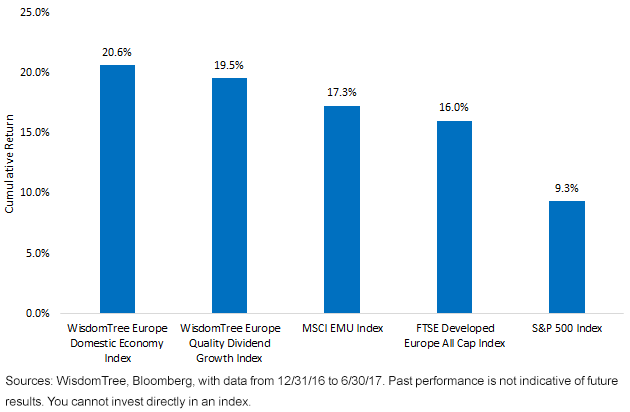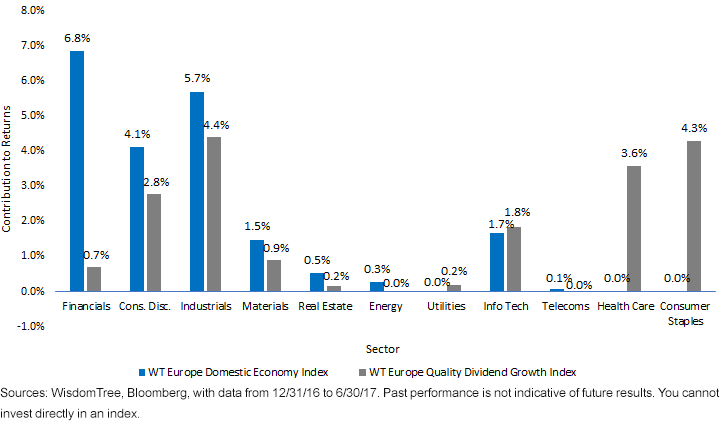Which European Strategies Work Now?


With the news flow we’ve seen thus far in 2017, it would have been difficult to predict any broad-based strategies focused on European equities being up 20% or more around the half-year point. Yet:1
- European equity indexes have significantly outperformed U.S. equities, giving credence to the belief that after elections ended up outside of the “disaster” scenarios, broad-based equity recovery has occurred.
- With the euro up 8.62% year-to-date, many investors have been looking for unhedged exposures.
- WisdomTree has two strategies, the WisdomTree Europe Domestic Economy Index and the WisdomTree Europe Quality Dividend Growth Index, that delivered close to 20% returns in the first half of 2017, beating the established market capitalization-weighted benchmarks.
Two Ways to Win in First Half 2017: Domestic Economy & Quality Dividend Growth

For definitions of terms in the chart, visit our glossary.
- The MSCI EMU Index and the FTSE Developed Europe All Cap Index are two of the most widely followed benchmarks of European equity performance for U.S. investors utilizing exchange-traded funds (ETFs). Both have handily outperformed the S&P 500 Index during the first half of 2017, something not many were predicting in the face of all the elections at the beginning of the year.
- The WisdomTree Europe Domestic Economy Index, notable for its focus on companies that derive more than 50% of their revenues from INSIDE Europe, delivered a 20.6% return over this period. We’ve generally heard that the European thesis in 2017 is dependent upon activity in Europe turning up and looking stronger. This Index is designed to tap into that type of exposure, whereas both the MSCI EMU and FTSE Developed Europe All Cap Indexes focus predominantly on large caps, many of which are multinationals.
- The WisdomTree Europe Quality Dividend Growth Index delivered a 19.5% return over this period. Instead of having a focus on where revenues are generated, this Index focuses on quality that leads to, most notably, a large under-weight to Financials. It’s intriguing how this compares to a large over-weight in Financials for the WisdomTree Europe Domestic Economy Index and that both Indexes have delivered strongly in 2017.
WisdomTree’s Indexes Generated Their Returns Quite Differently during 1H17

Usually, a wide dispersion in sector exposure comes with a wide dispersion in performance, but we saw clearly that 1) both of the WisdomTree strategies mentioned earlier outperformed their market capitalization-weighted competition in 2017 and 2) they each generated fairly similar returns around that 20% level.
- The WisdomTree Europe Domestic Economy Index delivered its 20% return through its exposures in Financials, Consumer Discretionary and Industrials, at least for the most part. If investors are looking at Financials as an opportunity, this Index has definitely tapped into that sector, and it has benefited recently from the equity reaction that occurred as a result of the recent announcements out of Italy. Notably, this Index is designed not to have exposure to Utilities, Telecommunication Services, Health Care or Consumer Staples due to its positioning as a European cyclical growth-oriented index.
- The WisdomTree Europe Quality Dividend Growth Index has a focus on quality, which tends to manifest itself through tilting away from firms with higher leverage. My colleague’s recent blog post focused on the long-term benefits to a quality approach. Since European Financials remain one of the most highly levered exposures in global equity markets—not to mention European equity markets—this tends to be a very pronounced under-weight. Two of the top three contributors to the 1H17 return for this strategy, Health Care and Consumer Staples, aren’t even eligible for inclusion in the WisdomTree Europe Domestic Economy Index.
We think that the fact that two strategies so widely differentiated in their focus on European equities are both doing well points to something that no one was predicting six months ago: Europe’s equity market has been one of the strongest globally in 2017.
Two Unhedged Approaches to Europe at WisdomTree
What’s also notable about both the WisdomTree Europe Domestic Economy Index and the WisdomTree Europe Quality Dividend Growth Index is that they represent unhedged exposures to European equities. That means if European currencies are strengthening against the U.S. dollar, they benefit. In 1H17, that was largely the trend, and for those who desire this exposure, these two strategies represent unique tilts on broader market capitalization-weighted indexes.
1Sources for all bullets: WisdomTree, Bloomberg, with data from 12/31/16 to 6/30/17.
Important Risks Related to this Article
Investments focused in Europe increase the impact of events and developments associated with the region, which can adversely affect performance.
Investments focusing on certain sectors and/or smaller companies increase their vulnerability to any single economic or regulatory development. This may result in greater share price volatility.

Christopher Gannatti began at WisdomTree as a Research Analyst in December 2010, working directly with Jeremy Schwartz, CFA®, Director of Research. In January of 2014, he was promoted to Associate Director of Research where he was responsible to lead different groups of analysts and strategists within the broader Research team at WisdomTree. In February of 2018, Christopher was promoted to Head of Research, Europe, where he was based out of WisdomTree’s London office and was responsible for the full WisdomTree research effort within the European market, as well as supporting the UCITs platform globally. In November 2021, Christopher was promoted to Global Head of Research, now responsible for numerous communications on investment strategy globally, particularly in the thematic equity space. Christopher came to WisdomTree from Lord Abbett, where he worked for four and a half years as a Regional Consultant. He received his MBA in Quantitative Finance, Accounting, and Economics from NYU’s Stern School of Business in 2010, and he received his bachelor’s degree from Colgate University in Economics in 2006. Christopher is a holder of the Chartered Financial Analyst Designation.

